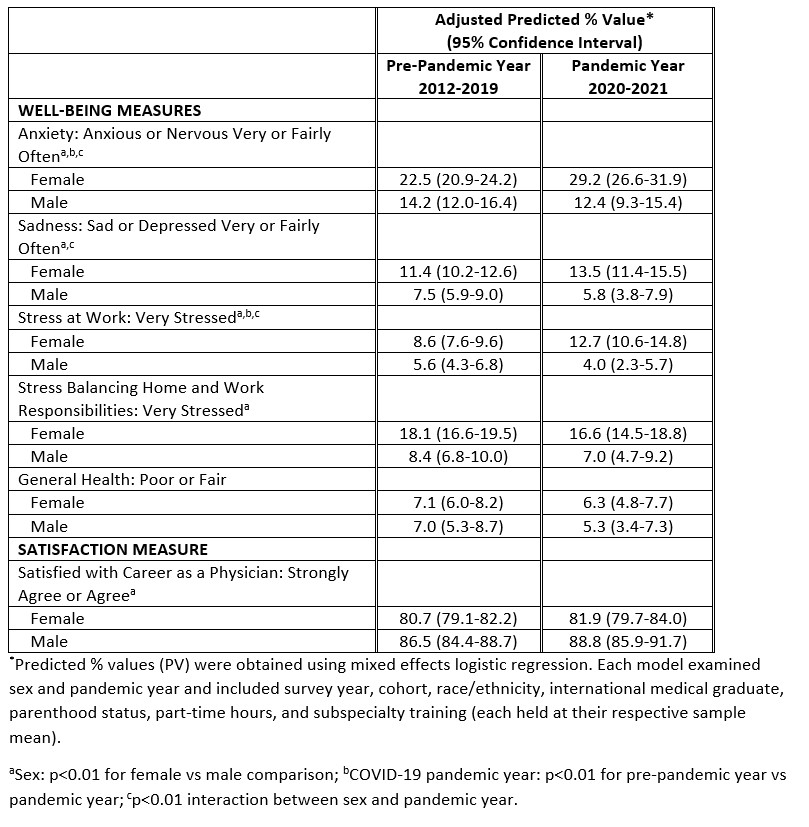Frintner M, Leslie L, Gottschlich E, Starmer A, Byrne B, Freed G
Presented at the 2023 Pediatric Academic Societies Annual Meeting
Background: Prior to the COVID-19 pandemic, important differences among female and male physicians included work-life balance challenges.
Objective: Using longitudinal survey data, examine pediatrician well-being and career satisfaction by sex during the COVID-19 pandemic (2020-2021) compared to pre-pandemic years.
Methods: Data from a national cohort study, AAP Pediatrician Life and Career Experience Study (PLACES) were used to examine pediatrician-reported well-being and career satisfaction each year, 2012-2021. Cohorts were based on residency graduation years: 2009-11 and 2002-04 (N=1793; 40% enrollment); 1777 (99%) responded in multiple years and were included in analyses. We used mixed effects logistic regression to examine 5 well-being measures and career satisfaction for sex (female vs male) and pandemic year (2012-19 vs 2020-2021) and their interaction effect. Well-being measures were: 1) anxiety; 2) sadness; 3) stress at work; 4) stress balancing home/work responsibilities; 5) general health. Satisfaction defined as strongly agree/agree satisfied with career as a physician. Models also included survey year, cohort, race/ethnicity, international medical graduate, parenthood status, part-time hours, and subspecialty training. We present adjusted predicted % values (PV) for sex and pandemic year and significant differences for a) sex; b) pandemic year; c) interaction of sex and pandemic year.
Results: 73% of participants identify as female. Adjusting for survey year and other characteristics, significant sex differences were found for 4 of 5 well-being measures and career satisfaction, pandemic year differences for 2 well-being measures, and interactions of sex and pandemic year for 3 well-being measures (Table). Females report higher levels of anxiety, sadness, and work stress both periods. Sex differences were greater during the pandemic, when female PVs were double those of males on all 3 measures. For example, females were more likely to report feeling anxious during the pandemic (PV=29.2, CI=26.6-31.9 and PV=12.4, CI=9.3-15.4, p<0.01). Females were also more likely than males to report stress balancing responsibilities and lower career satisfaction but these differences were not statistically more pronounced during the pandemic.
Conclusion: Among early and mid-career pediatricians, females reported lower well-being on measures of anxiety, sadness, and stress at work; differences were more pronounced during the pandemic. Eight in 10 report satisfaction with their career, though female were slightly less satisfied.
Table 1. Female and male early and mid-career pediatricians’ reported well-being and career satisfaction pre-pandemic and pandemic year

Last Updated
05/22/2023
Source
American Academy of Pediatrics